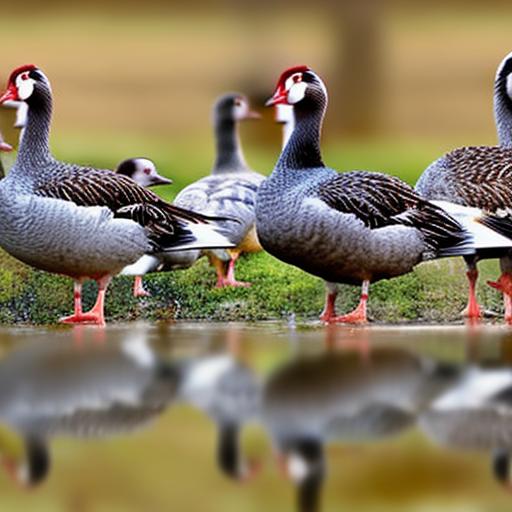Keeping geese and chickens together is a popular practice among poultry enthusiasts. It offers several benefits, including natural pest control, increased egg production, and companionship for both species. Personally, I have had the pleasure of keeping geese and chickens together on my farm for several years, and it has been a rewarding experience.
Key Takeaways
- Keeping geese and chickens together can be a great way to diversify your backyard flock.
- Benefits of keeping geese and chickens together include increased pest control and social interaction.
- Understanding the social dynamics of geese and chickens is important to prevent aggression and injury.
- Housing requirements for geese and chickens should include separate areas for nesting and roosting.
- Feeding requirements for geese and chickens should be balanced and appropriate for each species.
Benefits of Keeping Geese and Chickens Together
One of the main benefits of keeping geese and chickens together is natural pest control. Geese are excellent grazers and will eat a variety of insects, including ticks, grasshoppers, and beetles. By allowing geese to roam freely with the chickens, you can significantly reduce the pest population in your yard or pasture.
Another benefit is increased egg production. Geese are known to be excellent egg layers, and their presence can stimulate the chickens to lay more eggs as well. This can be especially beneficial if you have a small flock of chickens and are looking to maximize your egg production.
Lastly, keeping geese and chickens together provides companionship for both species. Geese are social animals and enjoy the company of other birds. They will often form close bonds with their chicken counterparts, creating a harmonious and enjoyable environment for all.
Understanding the Social Dynamics of Geese and Chickens
It is important to understand the social dynamics within flocks when keeping geese and chickens together. Both geese and chickens have a hierarchical structure, with dominant individuals asserting their authority over others.
Geese can be territorial and may display aggressive behavior towards other birds, especially during breeding season. It is important to provide enough space for each bird to establish their own territory and minimize conflicts. Additionally, providing multiple feeding stations and nesting areas can help reduce competition among the birds.
Compatibility between geese and chickens largely depends on the individual personalities of each bird. Some geese may be more tolerant of chickens, while others may be more aggressive towards them. It is important to monitor the behavior of the birds closely and intervene if any aggression becomes excessive.
Housing Requirements for Geese and Chickens
When keeping geese and chickens together, it is important to provide appropriate housing that meets the needs of both species. The coop and run design should be spacious enough to accommodate the number of birds you have, with enough room for each bird to move around comfortably.
Geese require more space than chickens, as they are larger birds and need room to spread their wings and graze. A general rule of thumb is to provide at least 10 square feet of space per goose and 4 square feet per chicken in the coop. In the run, aim for at least 20 square feet per goose and 10 square feet per chicken.
Nesting boxes and roosts should also be provided for both geese and chickens. Geese prefer to nest on the ground, so providing a soft bedding material such as straw or hay in a secluded area of the coop can encourage them to lay their eggs there. Chickens, on the other hand, prefer elevated nesting boxes with soft bedding material.
Feeding Requirements for Geese and Chickens
Geese and chickens have different dietary needs, so it is important to provide appropriate feed for each species. Geese require a diet that is higher in protein and lower in carbohydrates compared to chickens. A commercial waterfowl feed or a mix of grains, such as corn, wheat, and barley, can meet the nutritional needs of geese.
Chickens, on the other hand, require a balanced diet that includes a mix of grains, protein sources (such as soybean meal or fish meal), and calcium (such as crushed oyster shells). A commercial poultry feed formulated for laying hens is a convenient option that provides all the necessary nutrients.
In addition to their regular feed, geese may benefit from supplemental feeding. Fresh greens, such as lettuce, kale, and spinach, can be offered to geese as a treat and to provide additional nutrients. It is important to avoid feeding geese bread or other processed foods, as these can be harmful to their health.
Both geese and chickens require access to clean and fresh water at all times. Geese have a higher water requirement compared to chickens, as they use water for drinking, bathing, and preening. Providing a shallow pool or pond for the geese to swim in can help meet their water needs.
Health Concerns When Keeping Geese and Chickens Together

When keeping geese and chickens together, there are several health concerns to be aware of. Disease transmission between species is a potential risk, so it is important to practice good biosecurity measures. This includes keeping the coop and run clean and disinfecting any shared equipment or feeders.
Parasite control is also important when keeping geese and chickens together. Both species can be affected by external parasites such as mites and lice. Regularly inspecting the birds for signs of infestation and treating them promptly can help prevent the spread of parasites.
Common health issues that can affect both geese and chickens include respiratory infections, digestive disorders, and reproductive problems. Providing a clean and stress-free environment, along with a balanced diet, can help prevent these issues. Regular veterinary check-ups are also recommended to ensure the overall health of the flock.
Managing Flocks of Geese and Chickens
Managing flocks of geese and chickens requires daily care and maintenance. This includes providing fresh food and water, cleaning the coop and run, and monitoring the behavior and health of the birds.
Egg collection is an important task when keeping geese and chickens together. Geese typically lay their eggs on the ground, so it is important to collect them promptly to prevent breakage or contamination. Chicken eggs should be collected daily as well to ensure freshness.
Winter care is also a consideration when keeping geese and chickens together. Both species can tolerate cold temperatures, but providing adequate shelter and protection from the elements is important. Insulating the coop and providing extra bedding can help keep the birds warm during the winter months.
Breeding Considerations for Geese and Chickens
Breeding geese and chickens can be a rewarding experience, but it requires careful planning and consideration. Geese can be bred naturally or through artificial insemination, depending on your goals and resources. Natural breeding requires a compatible pair of geese and a suitable nesting area.
Incubation and hatching of eggs can be done naturally by the geese or using an incubator. If using an incubator, it is important to follow the manufacturer’s instructions and provide the appropriate temperature and humidity levels for successful hatching.
Caring for chicks involves providing a warm and safe environment, appropriate feed, and regular monitoring of their health. Chicks should be kept separate from adult birds until they are old enough to integrate into the flock.
Tips for Keeping Geese and Chickens Together Successfully
To keep geese and chickens together successfully, there are several tips to keep in mind. When introducing new birds to the flock, it is important to do so gradually and monitor their behavior closely. Providing adequate space and resources, such as nesting boxes and feeding stations, can help minimize competition and aggression.
Monitoring the behavior and health of the birds on a regular basis is important to identify any issues early on. This includes observing their interactions, checking for signs of illness or injury, and addressing any concerns promptly.
Is Keeping Geese and Chickens Together Right for You?
Keeping geese and chickens together offers several benefits, including natural pest control, increased egg production, and companionship for both species. However, it is important to understand the social dynamics, provide appropriate housing and feeding, and address any health concerns that may arise.
Personally, I have found keeping geese and chickens together to be a rewarding experience. The geese provide excellent pest control and their presence has stimulated increased egg production in my flock of chickens. Additionally, the companionship between the two species creates a harmonious and enjoyable environment on my farm.
If you are considering keeping geese and chickens together, I encourage you to give it a try. With proper planning and care, it can be a fulfilling and beneficial endeavor for both you and your birds.
If you’re considering keeping geese with chickens, it’s important to understand the dynamics and potential challenges of this arrangement. One related article that can provide valuable insights is “Can I Keep Geese with Chickens?” by Poultry Wizard. This informative piece explores the compatibility of geese and chickens, discussing factors such as space requirements, feeding habits, and potential conflicts. To learn more about this topic, check out the article here.
Meet Walter, the feathered-friend fanatic of Florida! Nestled in the sunshine state, Walter struts through life with his feathered companions, clucking his way to happiness. With a coop that’s fancier than a five-star hotel, he’s the Don Juan of the chicken world. When he’s not teaching his hens to do the cha-cha, you’ll find him in a heated debate with his prized rooster, Sir Clucks-a-Lot. Walter’s poultry passion is no yolk; he’s the sunny-side-up guy you never knew you needed in your flock of friends!







